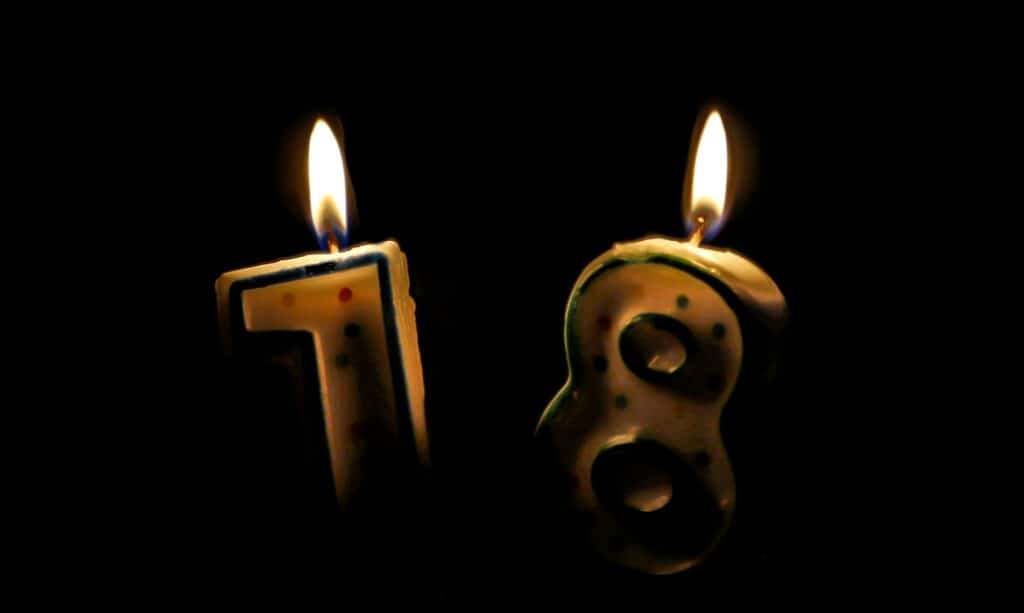Behind national conversations about sexual consent is the reality that we have abandoned people to themselves.
We reframe this abandonment using the romantic American ideals of autonomy, self-determination, liberty, and freedom. They are powerful words, loaded with emotion and potential, as are the mantras of those who champion them:
I’m my own person.
My body, my choice.
It’s fine as long as it’s not hurting anyone else.
There is a caveat, however.
In America, and most countries around the world, one cannot enjoy (partially) unchecked individualism until the age of eighteen.
Majority

This commonly accepted age of majority has no relation to physiology, cognitive ability, or sexual maturity. It’s a social consensus based, in America, on the desire of Vietnam-era activists to align the voting age and military draft requirement. Their efforts resulted in the 26th amendment to the Constitution and here we are.
But exceptions abound. Despite having no legal autonomy, we are considered responsible enough by the age of sixteen to work most jobs and operate a motor vehicle. And even after we’ve aged into legal autonomy at eighteen, we still cannot rent a car, purchase a handgun, or drink alcohol until we’re twenty-one. We can’t be a State Representative until we’re twenty-five. We can’t be a State Senator until thirty. And we can’t be President until we’ve reached the ripe old age of thirty-five.
There are rationales for all of these exceptions, with economics and insurance statistics being the main drivers. Young people get into more car accidents. The numbers are even worse when they’re drinking, so we stagger these permissions, letting them drive earlier and drink later. More kids working means fewer kids in school. Over time, we end up with lots of skilled manual labor, but we fall short in the STEM fields.
The enactment of laws to reduce or prevent child labor is often framed as benevolent, an attempt by the state to reduce harm. No doubt, there are certain individuals or parties looking out for the kids, but the ongoing debate around which jobs can be worked at what age tells us that where the potential for profits outweighs liability, child labor is still very much on the table.
This is not a piece about child labor, but we’re touching on it as an example of how our contemporary ethical sensibilities around age and agency are informed almost exclusively by the mores of a secular marketplace and the PR outlets that advance them.
America has evolved into an aggressively capitalist entity. America does not care about the health and wellbeing of children beyond keeping them alive long enough to feed the system.
Rites of Passage

In opposition to secular humanist notions of agency which fluctuate, tied as they are to marketplace economics, we as Muslims are not concerned with legal autonomy. Adulthood is rather framed as the beginning of communal accountability and this is linked to sexual maturity. Puberty initiates one into the procreative dimension. Society has a shared stake in new babies and, as such, the moment is honored and often celebrated in community.
Muslims don’t actually do a great job of communally recognizing puberty, though there may be some precedent for it, as in this hadith shared by Umayyah bint Qays, may God be pleased with her. She was from the tribe of Ghifar and volunteered as a nurse in the military campaign at Khaybar. She is cited in M. Akram Nadwi’s book, Al-Muhadidithat: The Women Scholars of Islam:
“Then we set out with him.
“I was a young girl. He made me sit on his she-camel behind the luggage. I saw the bag had got traces of blood from me. It was the first time I had a period. Then I sat forward on the camel [to hide it] and I was embarrassed. When the Messenger of God ﷺ saw what happened to me and the traces of blood, he said, “Perhaps you have had menstrual bleeding?” I said, “Yes.” He said, “Attend to yourself. Then, take a container of water, then put salt in it, then wash the affected part of the bag, then come back.” I did so.
“When God conquered Khaybar for us, the Prophet took this necklace that you see on my neck and gave it to me and put it on my neck with his own hand. By God it will never be parted from me.”
She wore the necklace her entire life and stipulated that she should be buried with it.
Although we cannot be certain about the motivation behind gifting the necklace, whether in gratitude for her service on the battlefield or in commemoration of her transition to adulthood, we know that her menstruation was honored through normalization and instruction.
(side note: despite her traveling to Khaybar as a nurse, some say that the gift was in recognition of her fighting)
American Muslims have a lot of work and research to do in this area, but for now just think about the quinceañeras of Mexico, the debutante balls of the deep south, or the bar and bat mitzvahs of Judaism. Scanning the anthropological literature of the world’s cultures past and present, one will see this pattern over and over. The onset of puberty is commemorated with celebration, rituals, and various austerities as young people are made aware of their heightened level of communal responsibility and accountability.
Ethnographer Arnold van Gennep studied these things and he described three stages of your typical rites of passage experience: separation, transition, and incorporation.
Shades of this still show up in secular humanist culture, with high school graduation providing a serviceable example of a contemporary, albeit broken, rite of passage. Although not tied to sexual maturity, it is still a moment often celebrated in community. We see first-stage “separation” in the example of going away to college. Once there, we experience the second stage of “transition” or liminality, where we receive new information and experiences that introduce a certain level of cognitive dissonance. Not everything is in alignment with what we had been taught at home. We stand precariously between our previous status as dependent subjects of parental authority, and the frightening excitement of possibilities well beyond the boundaries of our upbringing.
Van Gennep’s third stage of incorporation requires reintegration of the newly expanded individual back into society. This is where we think things fall apart in the modern American context. Pluralism has some spectacular advantages, but it complicates the project of identity and incorporation.
We cannot expect to be received automatically by our home group after our post-liminal college experience. We will learn things and discover new ways of being that may incentivize affiliation with an entirely new subculture. This may bring friction or distance into our historical relationships and complicate our reception and incorporation.
The rite of passage is unfinished. Even if we are ultimately received by a new group with values and practices in keeping with our evolving trajectory, this new group was not there at the initiation of our rite. They do not have the comprehensive insight into our history to adequately mark our transition.
Nowhere are we holistically seen.
There is no one to witness our transition beyond our self. Separated from the biologically momentous occurrence of puberty, the forsaken rite is corrupted by college debt and alienation. We are left wondering what the point might be.
This is existential loneliness at its most desperate. The pathways to isolation may differ, but the result of a disrupted initiation rite is often some version of “I am” versus “we are.”
And this isolation is the unfortunate context for the contemporary conversation around sexual consent.
Guardianship

In the modern American context, sexual maturity is marked only by the provision of condoms and feminine hygiene products. Sexuality is framed in recreative rather than procreative terms. The powerful implications of the sexual act, bonding, intimacy, and childbirth, are systematically downplayed even as contemporary media whips us all into an orgiastic furor.
Sexuality is now a comodifed tool of the marketplace. We are manipulated through it and shamed in the process.
Social reintegration is absent from whatever remains of our anemic rites of passage, decoupled as they are from our sexual development. As such, we’re on our own to decide how we want to exercise our sexual potential. The self becomes the ultimate arbiter of what is best.
Disease, abortion, abuse, and infidelity follow.
Now a public health issue, we are forced into a societal conversation about sexual consent, what it means, how it’s indicated, under what circumstances it may or may not be acceptable, and at what age it becomes possible. And the terms of the conversation assume that informed personal choice is the only inviolable standard that must be accommodated.
But is that true?
There are many traditional cultures with intact rites of passage where sexual maturity is understood to be the beginning of moral accountability. It is also understood that puberty is a confusing and volatile period. Intellectual, physical, and emotional development are lagging and therefore communal support and direction is both warranted and invited. Young people in such cultures have guardians, often elder male family members, who negotiate their opportunities for sexual expression through arranged marriages or the vetting of potential suitors.
It wasn’t so long ago in America when young men were expected to ask a woman’s father for her hand in marriage. And before he popped the question, he would often approach his own father for permission to address the family of his beloved. Rejection was an accepted possibility.
But now it is the requirement of a father’s consent which is rejected.
Feminist Gerda Lerner wrote The Creation of Patriarchy in 1986. Responding to the abuse and misuse of male power, the protective intent of male guardianship was reframed as the appropriation of a woman’s sexual and reproductive capacities. Female bodily autonomy remains a core principle in what came to be known as “reproductive justice.”
Thirty-eight years later, the “man or bear” social media debate went viral in 2024. Given the choice to be alone in the woods with a man or a bear, women everywhere chose the bear. In one generation of goddess-cult grifters dismantling the patriarchy, the fear of men among women has reached such a level that they publicly declare feeling safer with a wild animal.
And the fear of women among men is no better. Incel culture is a noteworthy example, sometimes manifesting in extreme acts of violence against women. More often, lonely men are taken advantage of by other men who sell them on alpha male courses and bootcamps promising unlimited sexual access to women.
A Better Way

As Americans, we made a collective, societal decision to divorce sexual maturity from legal autonomy.
We commemorate the latter with broken rituals including graduation ceremonies and tossing back one’s first margarita. We dismiss the former with shoulder shrugs about how you can’t stop kids from having sex. We have been duped into believing that this is how we acknowledge agency and autonomy when all we’ve really done is abandoned our youth to the wolves.
And now they are tasked with trying to navigate their sexuality and the question of consent in a world of #metoo, pride month, and #notallmen. The birthrate is plummeting. Pornography and AI soulmates are converting the sexual energy of the masses into billions of dollars for the few. Men and women are afraid of each other and loneliness is a bonafide public health epidemic.
Dismantling the patriarchy was a bad idea.
We are now in a radically traumatized period of overcorrection that must be addressed. And if you were expecting answers, we’re excited to disappoint you.
We do have ideas, however, points for further discussion.
We believe in the role and responsibility of men to frame and defend what is socially acceptable. In order to do this, they must first demonstrate this capacity through the exhibition of their own self-regulation. Men must be engaged at the community level in order for others to accurately attest to this aspect of their character. And we invite men into community through a formalized and coherent initiation rite.
Women have a responsibility to inform the thought processes and belief systems of men. As mothers, they must refuse to cater to their sons, rather demanding the opposite in their exercise of intentional parenting. Daughters must be taught to trust their own voices by fathers who actively listen and advocate their positions with integrity. Women must be similarly initiated through a celebration of menarche as an antidote to the shame and embarrassment that our response to the experience typically embeds.
Social guardianship and communal engagement must be renewed as a protective prelude to sexual consent which, we affirm, remains a deeply personal decision.
But it’s not one we need make alone.
Leave a comment below for posterity or join us in the D&T Chautaqua Discord to discuss this post with other adventurous spirits from around the world.
